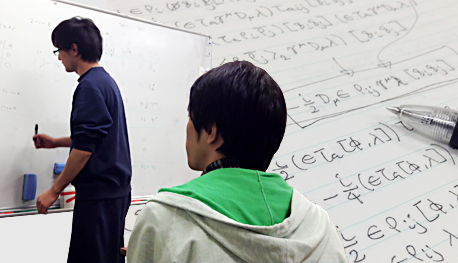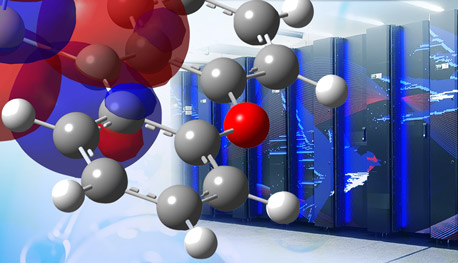Education
Physics Undergraduate MajorCurriculum
Specialized education built on a broad foundation —
a solid footing for researchers and engineers
Physics, which describes natural phenomena through a small number of basic principles, is not only essential to cutting-edge research in natural sciences, but is also foundational to other fields including engineering. When students begin their Physics Undergraduate Major in their second year, they study 200- and 300-level courses with a central focus on subjects that form the basis of the modern physics. Lectures are integrated with exercises and are also linked to related experiments to enable students to effectively cover basic to advanced contents. The systematic teaching of courses enables students to obtain a high level of basic academic skills. Experiments and exercises are designed to allow students to strengthen their logical thinking and practical problem-solving skills. Courses that allow students to engage in cutting-edge research enable them to develop innovative and creative power as well as a global perspective. The curriculum is designed to foster highly skilled and diverse individuals who are capable of either driving forward cutting-edge research in natural sciences or taking on active roles in various sectors of society by utilizing their scientific backgrounds.
-
1st Year
- 100-Level Courses
-
Students in their first year of undergraduate studies receive basic education that centers on Institute-wide compulsory courses regardless of their discipline. The 100-level courses are designed to teach common, basic skills that are required of science and technology students. The aims of these courses are to provide knowledge and cultivate versatile intellect necessary for studying at the Institute.
-
2nd Year
3rd Year- 200-Level and 300-Level Courses
-
Students who complete their 100-level courses advance to study their undergraduate major. Courses at the 200- and 300-levels specific to the Physics Major are taken in accordance with the curriculum.
-
- Courses on Experiments in Physics
- Physics, as with other natural sciences, bases its study on experimental evidence. In the Experimental Physics course, the significance of data acquisition is discussed, which is then followed by instruction in basic measurement techniques and statistical processing of data. In the courses named Experiments in Physics, students work in pairs to tackle the following topics: optics, electronics, vacuum, and radiation measurements. The Computational Physics course is also available to students who wish to study numerical algorithms and develop their applied skills through programming.
-
- Courses on Mathematical Methods in Physics
- Mathematics serves as a tool to formulate the fundamentals of physics, and to provide the language necessary to express ideas and concepts without ambiguity. Physics research often involves solving equations and transforming mathematical formulas that describe physical systems. To help students prepare for research, courses of Mathematical Methods in Physics are provided, covering subjects such as differential equations, special functions theory, complex functions theory, and integral transforms. Group theory, which is essential to field theory, is also covered.
-
- Courses on Electromagnetism
- These courses provide a systematic teaching of electromagnetism using vector analysis. Maxwell's equations are derived, which are then used to describe how electromagnetic waves radiate, propagate through matter, and reflect and refract at interfaces. Furthermore, students are taught the role that the special theory of relativity has in electromagnetism.
-
- Courses on Quantum Mechanics
- In these courses, students are first introduced to analytical mechanics, which provides a systematic formulation of classical mechanics. This naturally leads to basics of quantum mechanics, which forms the basis of modern physics. The courses then cover single-particle problems under spherical potentials, introducing angular momentum and concepts such as scattering. Techniques useful for describing actual physical systems, such as perturbation theory, are also dealt with. Spin and second quantization are also covered. An advanced course is also available that covers relativistic quantum mechanics, which incorporates special relativity into quantum mechanics.
-
- Courses on Thermodynamics and Statistical Mechanics
- In Thermodynamics, students will learn about macroscopic properties of matter, which consists of a huge number of degrees of freedom in the order of the Avogadro number. In Statistical Mechanics, students are taught how such macroscopic properties can be derived out of microscopic interactions of particles. The courses also cover quantum statistics, which incorporates quantum mechanics into statistical mechanics, and concepts such as phase transition and phase equilibrium.
-
- Courses on Condensed Matter Physics
- To gain an understanding of physical properties of condensed matter, in Basic Solid State Physics, students will learn crystal lattices and the quantum mechanical state of electrons. On the basis of this knowledge, the course also covers dielectric materials, magnetism, and transport phenomena including superconductivity. Chemical Physics provides an understanding of molecular structures and reactions through quantum mechanics. Plasma Physics deals with properties of plasma, regarded as electromagnetic fluids.
-
- Courses on High Energy Physics
- Nuclear Physics deals with the structure of the nucleus, which is made of protons and neutrons, as well as principles of the nuclear decay. In the Elementary Particles course, students are introduced to the Standard Model, which classifies fundamental particles and explains how they interact, with reference to how the model developed through experiments and theories. In the course entitled Physics of the Universe, students are exposed to the latest understanding of the universe through a variety of topics, starting from the basics.
-
-
4th Year
- 200-Level and 300-Level Courses
-
At the final stage of the 300-level is the Independent Research Project (equivalent to the Undergraduate Thesis Research that was in place previously). The project is intended to serve as a capstone for students to consolidate and reinforce all of the skills acquired in their major. Furthermore, they may choose to enroll in the Advanced Independent Research Project. The purpose of this course is to enhance students' interest in scientific and technological research that began with the Independent Research Project, as it provides the opportunity for them to actively engage in science- and technology-related activities.
* The timeline depicts a standard case where students complete their bachelor's degree program in four years.
-
Entrance Examination
Students need to pass an entrance exam to advance from a bachelor's to a master's program. To advance from a master's to a doctoral program, students must pass an advancement assessment.
-
Graduate Major
Master's Program
Doctoral Program- 400-Level, 500-Level, and 600-Level Courses
-
Students who complete the Physics Undergraduate Major may continue to study the discipline in more depth by taking the Physics Graduate Major. There is also closely related interdisciplinary graduate major, Materials and Information Sciences.
-
- Department that offers this graduate major
-
- Physics
-
-
-
- Department that offers this graduate major
-


